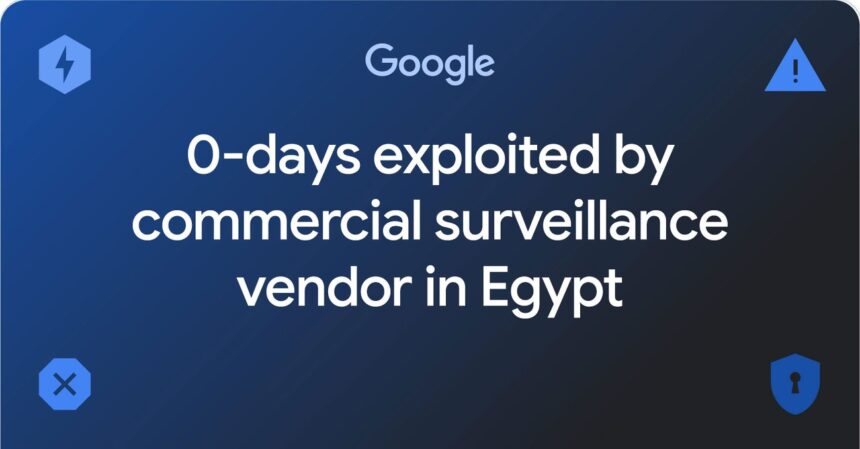Final week Google’s Menace Evaluation Group (TAG), in partnership with The Citizen Lab, found an in-the-wild 0-day exploit chain for iPhones. Developed by the industrial surveillance vendor, Intellexa, this exploit chain is used to put in its Predator adware surreptitiously onto a tool.
In response, yesterday, Apple patched the bugs in iOS 16.7 and iOS 17.0.1 as CVE-2023-41991, CVE-2023-41992, CVE-2023-41993. This fast patching from Apple helps to higher defend customers and we encourage all iOS customers to put in them as quickly as doable.
Exploit supply by way of man-in-the-middle (MITM)
The Intellexa exploit chain was delivered by way of a “man-in-the-middle” (MITM) assault, the place an attacker is in between the goal and the web site they’re making an attempt to achieve. If the goal goes to an internet site utilizing ‘http’, then the attacker can intercept the site visitors and ship faux knowledge again to the goal to power them to a unique web site. Visiting an internet site utilizing ‘https’ signifies that the site visitors is encrypted, and it’s simply verifiable that the acquired knowledge got here from the meant web site utilizing their certificates. That isn’t the case when utilizing ‘http’.
Within the case of this marketing campaign, if the goal went to any ‘http’ web site, the attackers injected site visitors to silently redirect them to an Intellexa web site, c.betly[.]me. If the person was the anticipated focused person, the positioning would then redirect the goal to the exploit server, sec-flare[.]com. Whereas there’s a highlight on “0-click” vulnerabilities (bugs that don’t require person interplay) this MITM supply additionally didn’t require the person to open any paperwork, click on a selected hyperlink, or reply any telephone calls.
iOS Exploit Chain
As quickly because the attacker redirected the goal to their exploit server, the exploit chain started to execute. For iOS, this chain included three vulnerabilities:
- CVE-2023-41993: Preliminary distant code execution (RCE) in Safari
- CVE-2023-41991: PAC bypass
- CVE-2023-41992: Native privilege escalation (LPE) within the XNU Kernel
The chain then ran a small binary to determine whether or not or to not set up the total Predator implant. Nonetheless, TAG was unable to seize the total Predator implant.
We plan to publish a technical deep dive on these exploits consistent with the Google vulnerability disclosure policy.
Android Exploit Chain
The attacker additionally had an exploit chain to put in Predator on Android gadgets in Egypt. TAG noticed these exploits delivered in two other ways: the MITM injection and by way of one-time hyperlinks despatched on to the goal. We had been solely in a position to get hold of the preliminary renderer distant code execution vulnerability for Chrome, which was exploiting CVE-2023-4762.
This bug had already been individually reported to the Chrome Vulnerability Rewards Program by a safety researcher and was patched on September fifth. We assess that Intellexa was additionally beforehand utilizing this vulnerability as a 0-day.
Chrome’s work to guard in opposition to MITM
For years, Chrome has labored towards common HTTPS adoption throughout the online. Moreover Chrome has an “HTTPS-First Mode” that may cut back the probability of exploits being delivered by way of MITM community injection. “HTTPS-First Mode” will try and load all pages over HTTPS, and present a big warning earlier than falling again to sending an HTTP request. This setting is at present on by default for customers enrolled within the Advanced Protection Program who’re additionally signed into Chrome. We encourage all customers to enable “HTTPS-First Mode” to higher defend themselves from MITM assaults.
Conclusion
This marketing campaign is yet one more instance of the abuses attributable to the proliferation of business surveillance distributors and their critical threat to the security of on-line customers. TAG will proceed to take motion in opposition to, and publish analysis about, the industrial adware business, in addition to work throughout the private and non-private sectors to push this work ahead.
We wish to acknowledge and thank The Citizen Lab for his or her collaboration and partnership within the capturing and evaluation of those exploits, and Apple for deploying a well timed patch for the security of on-line customers.









